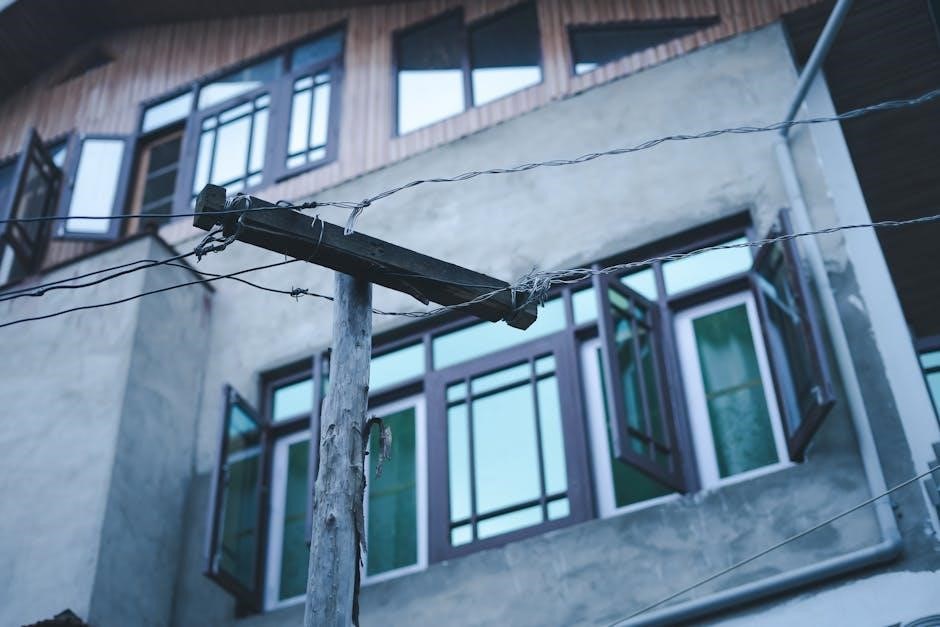A General Power of Attorney (GPA) is a legal document enabling NRIs to appoint a trusted representative in India to manage property, financial, and legal matters seamlessly. It ensures legal compliance and peace of mind.
1.1 Definition of GPA
A General Power of Attorney (GPA) is a legal document that authorizes a trusted individual in India to manage an NRI’s affairs, including property, finances, and legal matters. It is a revocable document that grants the attorney broad powers to act on behalf of the principal, enabling them to handle tasks such as buying or selling property, operating bank accounts, and resolving legal disputes. The GPA is particularly useful for NRIs who cannot physically attend to their affairs in India, ensuring their interests are safeguarded. It is executed on non-judicial stamp paper, notarized, and often attested by the Indian embassy or consulate if executed abroad. The GPA provides a comprehensive scope of authority, allowing the attorney to act as a lawful representative in all specified matters in India.
1.2 Purpose of GPA for NRIs
A General Power of Attorney (GPA) is essential for NRIs to manage their affairs in India effectively. Its primary purpose is to enable NRIs to appoint a trusted representative to handle property transactions, financial matters, and legal issues in their absence. This document is particularly useful for tasks such as selling or purchasing property, operating bank accounts, and resolving legal disputes. By granting broad powers to the attorney, NRIs can ensure their interests are safeguarded without requiring their physical presence in India. The GPA also helps avoid delays in legal and financial processes, ensuring seamless execution of transactions. It is a convenient and legally compliant solution for NRIs to manage their assets and obligations in India, providing peace of mind while they are abroad. The GPA is customizable to suit specific needs, making it an indispensable tool for NRIs with property or financial interests in India.
Key Features of General Power of Attorney
A General Power of Attorney (GPA) empowers a trusted individual in India to manage an NRI’s property, financial, and legal matters. It is revocable, granting broad authority to the attorney, who must be an Indian resident. The document must be executed on non-judicial stamp paper and notarized if created abroad, ensuring legal validity in India.
2.1 Scope of Authority
The General Power of Attorney (GPA) grants the appointed attorney broad authority to act on behalf of the NRI in India. This includes managing property transactions, such as buying, selling, or renting, as well as handling financial matters like operating bank accounts and investments. The attorney can also resolve legal disputes, sign documents, and complete registration formalities. The scope is comprehensive, allowing the attorney to act as a lawful representative in all specified affairs. However, the NRI can customize the GPA to limit the attorney’s powers to specific tasks, such as property registration or financial transactions, ensuring control over delegated responsibilities. This flexibility makes the GPA a versatile tool for NRIs to manage their affairs in India efficiently, even from abroad.
2.2 Types of Power of Attorney (GPA vs. SPA)
There are two primary types of Power of Attorney: General Power of Attorney (GPA) and Special Power of Attorney (SPA). A GPA grants broad authority, allowing the attorney to act on behalf of the principal in all matters, including property, finances, and legal affairs. This makes it a versatile tool for NRIs to manage multiple aspects of their affairs in India. In contrast, an SPA is limited to specific tasks, such as property registration or financial transactions, and is ideal for situations where the principal wants to restrict the attorney’s powers. For NRIs, the SPA is often recommended for its precision, as it allows them to delegate authority for particular acts while maintaining control over other matters. Understanding the differences is crucial for choosing the right option based on individual needs and ensuring legal compliance. Customization is key to aligning the document with the NRI’s specific requirements.

Importance of GPA for NRIs

A GPA is essential for NRIs to manage property, finances, and legal matters in India seamlessly. It empowers them to appoint a trusted representative, ensuring their interests are safeguarded without requiring physical presence.
3.1 Managing Property in India
A General Power of Attorney (GPA) is instrumental for NRIs to manage property in India effectively. It allows the appointed attorney to handle tasks such as buying, selling, renting, or transferring property on behalf of the NRI. This ensures that property-related matters are addressed promptly without requiring the NRI’s physical presence. The GPA grants the attorney authority to negotiate deals, acquire possession, sign sale deeds, and complete registration formalities. It is particularly useful for NRIs who own immovable assets in India but cannot manage them due to their absence. By delegating these responsibilities, NRIs can ensure their property interests are safeguarded and transactions are executed smoothly. The GPA also helps avoid delays and legal complications that may arise from unresolved property matters. This makes it an essential tool for NRIs to maintain control over their Indian properties while residing abroad.
3.2 Handling Financial and Legal Matters
A General Power of Attorney (GPA) is a vital tool for NRIs to manage financial and legal matters in India. It enables the appointed attorney to operate bank accounts, handle investments, and address tax-related issues on behalf of the NRI. This ensures seamless financial management, even from abroad. The GPA also empowers the attorney to resolve legal disputes, file cases, and represent the NRI in court proceedings. By delegating these responsibilities, NRIs can ensure their financial and legal interests are protected without requiring their physical presence. The GPA is particularly useful for managing complex legal processes, such as recovering debts or resolving property disputes. It provides a comprehensive solution for NRIs to maintain control over their financial and legal affairs in India, ensuring compliance with local laws and regulations. This makes the GPA an indispensable instrument for NRIs with financial or legal obligations in India.

Process of Creating a GPA
Creating a GPA involves drafting the document on non-judicial stamp paper, notarization, and witness signatures. For NRIs, execution abroad requires attestation by the Indian embassy or consulate, ensuring legal validity in India.
4.1 Drafting the GPA Document
Drafting a General Power of Attorney (GPA) document involves preparing a detailed legal deed on non-judicial stamp paper, outlining the scope of authority granted to the attorney. The document must include the grantor’s and attorney’s details, such as names, addresses, and relationships. It should clearly specify the powers being delegated, such as managing property, handling financial transactions, or resolving legal matters. The GPA should also mention whether it is revocable or irrevocable and include provisions for its termination. Legal advice is recommended to ensure compliance with Indian laws and to avoid ambiguities. The draft must be precise to prevent misuse, with clear instructions on the attorney’s responsibilities. Once drafted, the document is ready for execution, which includes signatures, witness attestation, and notarization. Proper drafting ensures the GPA is legally enforceable and aligns with the grantor’s intentions, providing a reliable framework for the attorney to act on their behalf in India.
4.2 Notarization and Apostille
After drafting the GPA, the next step is notarization and apostille to ensure its authenticity and legal validity in India. For NRIs executing the GPA outside India, the document must be notarized by a Notary Public in their country. The NRI must sign the GPA in the presence of the notary, who verifies their identity and witnesses the signature. Following notarization, the GPA must be apostilled, a process that authenticates the document for use in countries part of the Hague Convention, including India. In the U.S., the apostille is obtained from the Secretary of State’s office in the respective state. For NRIs in other countries, the document must be attested by the Indian embassy or consulate. The apostille or embassy attestation confirms the document’s legitimacy, enabling it to be recognized by Indian authorities. This step is crucial for the GPA to be legally enforceable in India, ensuring the attorney can act on behalf of the NRI without hindrance.

Legal Requirements for GPA in India
The GPA must be executed on non-judicial stamp paper with appropriate stamp duty, varying by state. It requires the grantor’s signature and initials on each page. Notarization is mandatory if executed abroad, followed by attestation by the Indian embassy or consulate. The attorney must be an Indian resident to ensure validity.
5.1 Stamp Duty and Non-Judicial Stamp Paper
The execution of a General Power of Attorney (GPA) in India requires adherence to specific legal formalities, including the payment of stamp duty. Stamp duty rates vary by state, with some states like Maharashtra requiring a minimum of Rs. 100 on non-judicial stamp paper. The GPA must be printed on non-judicial stamp paper of the requisite value, ensuring compliance with local laws. The grantor is responsible for affixing the appropriate stamp duty, which is a mandatory step to validate the document. Failure to use the correct stamp paper or pay the required duty can render the GPA invalid or lead to legal complications. The grantor must sign and initial each page of the GPA, confirming its authenticity. Additionally, the stamp duty rates differ based on the relationship between the grantor and the attorney, with nominal rates for close relatives and higher rates for unrelated individuals. Proper execution ensures the GPA is legally enforceable in India.
5.2 Registration Process
The registration of a General Power of Attorney (GPA) in India is a critical step to ensure its legal validity. The process involves submitting the GPA to the Sub-Registrar’s office, where it is officially recorded. The grantor must provide the original GPA, along with supporting documents such as a passport copy, PAN card, and address proof. Witness signatures are also mandatory for verification. If the GPA is executed outside India, it must be notarized and attested by the Indian Embassy or Consulate before submission. The Sub-Registrar verifies the document’s authenticity, ensuring compliance with legal norms. A registration fee is payable, and once verified, the GPA is stamped and signed, making it legally enforceable. Proper registration ensures the attorney can act on behalf of the grantor without hindrance, facilitating smooth transactions in India.
Advantages of Having a GPA
A GPA offers convenience, legal compliance, and peace of mind for NRIs. It enables seamless management of property, finances, and legal matters in India, reducing the need for physical presence and ensuring timely execution of tasks.
6.1 Convenience in Managing Affairs
A General Power of Attorney (GPA) provides unparalleled convenience for NRIs to manage their affairs in India. By appointing a trusted representative, NRIs can handle property transactions, financial matters, and legal disputes without physical presence. This eliminates the need for frequent travel, saving time and effort. The attorney can act swiftly on behalf of the NRI, ensuring timely execution of tasks like buying or selling property, operating bank accounts, and resolving legal issues. The GPA also allows for customization, enabling NRIs to grant specific powers tailored to their needs, such as managing investments or overseeing business operations. This flexibility ensures that all affairs are handled efficiently, reducing delays and ensuring seamless execution. With a GPA, NRIs can focus on their lives abroad while maintaining control over their interests in India, knowing their affairs are in capable hands.
6.2 Ensuring Legal Compliance
A General Power of Attorney (GPA) ensures legal compliance by adhering to India’s regulatory requirements, making it a secure and reliable tool for NRIs. The document must be executed on non-judicial stamp paper of appropriate value, as per the state’s stamp duty laws, and signed by the grantor. If executed outside India, it must be notarized by a Notary Public and attested by the Indian embassy or consulate to validate its authenticity. The GPA must also be registered with the Sub-Registrar’s office in India, along with supporting documents like the grantor’s passport and PAN card copies, to ensure legal enforceability. This process guarantees that the attorney’s actions are legally recognized, minimizing risks of disputes or non-compliance. By following these steps, NRIs can ensure their GPA is legally binding, allowing their representative to act on their behalf without legal hindrances. This compliance ensures smooth execution of tasks, safeguarding the NRI’s interests in India.
Challenges and Risks Associated with GPA
A GPA carries risks of misuse if the attorney exploits their broad powers. Ensuring the attorney is trustworthy is crucial. Legal safeguards and clear authority definitions can mitigate potential abuses, protecting the grantor’s interests.
7.1 Potential Risks of Misuse
A General Power of Attorney (GPA) carries inherent risks, particularly if the appointed attorney misuses their broad authority. Since a GPA grants extensive powers, there is a potential for unauthorized actions, such as selling property, making financial decisions, or entering into legal commitments without the grantor’s knowledge. This misuse can lead to significant financial losses or legal complications for the NRI. The risk is heightened if the attorney exploits their position for personal gain or fails to act in the grantor’s best interests. Ensuring the attorney is trustworthy and limiting the scope of authority can mitigate these risks. Additionally, regular monitoring and clear communication are essential to prevent misuse. NRIs must exercise caution when drafting a GPA, as its broad powers, if misused, can have long-lasting consequences. Consulting a legal expert to include safeguards and specific limitations is highly recommended to protect the grantor’s interests effectively.
7.2 Mitigating Risks
To mitigate the risks associated with a General Power of Attorney (GPA), NRIs should implement several safeguards. First, the GPA should clearly define the scope of authority, limiting it to specific tasks such as property management or financial transactions. Including a time limit for the GPA’s validity can prevent indefinite misuse. Additionally, appointing multiple attorneys-in-fact can ensure that no single individual has unchecked power. Regular audits and updates to the GPA can help maintain control and ensure compliance with the grantor’s intentions. It is also crucial to choose a trustworthy and reliable attorney, preferably a close family member or a well-vetted professional. Consulting with a legal expert to draft the GPA with built-in safeguards, such as requiring the attorney to provide periodic updates or seek approval for major decisions, can further reduce risks. By taking these precautions, NRIs can minimize the potential for misuse while still benefiting from the convenience of a GPA.

Sample GPA for NRIs
A sample GPA for NRIs outlines the appointment of an attorney to manage property, financial, and legal matters in India. It includes specific powers, such as buying/selling property and handling legal disputes, ensuring clarity and revocability.
8.1 Overview of the Sample Document
A sample General Power of Attorney (GPA) for NRIs is a structured legal document designed to appoint a trusted representative in India. It typically includes sections such as the executant’s details, the attorney’s appointment, and the scope of authority. The document outlines specific powers, such as managing property, handling financial transactions, and resolving legal disputes. It also clarifies the attorney’s responsibilities and limitations, ensuring transparency and accountability. The sample GPA often includes placeholders for customization, allowing NRIs to tailor the document to their specific needs. Legal formalities, such as notarization, apostille, and witness signatures, are highlighted to ensure compliance with Indian laws. The document may also include revocation clauses, emphasizing the executant’s right to modify or terminate the GPA as needed. Overall, the sample serves as a comprehensive template, guiding NRIs through the process of creating a legally valid and personalized GPA for managing their affairs in India.
8.2 Customizing the Sample for Specific Needs
Customizing a General Power of Attorney (GPA) sample for NRIs involves tailoring the document to address specific requirements and circumstances. The sample GPA serves as a template, but it is essential to modify it to reflect the individual’s needs, such as property management, financial transactions, or legal matters. NRIs can add or remove clauses to limit or expand the attorney’s powers, ensuring the document aligns with their objectives. For instance, specific powers like selling property, operating bank accounts, or handling investments can be included or excluded based on the NRI’s preferences. The document should also include details such as the executant’s and attorney’s information, the scope of authority, and revocation terms. Consulting a lawyer is recommended to ensure the customized GPA complies with Indian laws and accurately reflects the NRI’s intentions. Proper customization ensures the GPA is both legally valid and practically effective in managing affairs in India.

Executing GPA Outside India
NRIs can execute a GPA outside India by notarizing it with a Notary Public and attesting it through the Indian embassy or consulate. The attorney must be an Indian resident, and the document must comply with state-specific requirements.
9;1 Process of Execution Abroad
For NRIs executing a GPA outside India, the process involves several steps to ensure legal validity. First, the GPA must be drafted on non-judicial stamp paper of appropriate value as per the state’s requirements. The document should clearly outline the scope of authority granted to the attorney. Next, the GPA must be notarized by a Notary Public in the country of residence. This step ensures the authenticity of the signature and the document’s enforceability in India. After notarization, the GPA must be attested by the Indian embassy or consulate in the respective country. This attestation confirms the document’s legitimacy for use in India. Finally, the GPA is sent to India, where it must be adjudicated by the local Sub-Registrar’s office. Proper execution abroad ensures the GPA is legally recognized, allowing the attorney to act on behalf of the NRI seamlessly.
9.2 Role of the Indian Embassy or Consulate
The Indian embassy or consulate plays a pivotal role in the execution of a GPA by NRIs abroad. Their primary function is to attest and authenticate the GPA, ensuring it meets the legal requirements for recognition in India. After the GPA is notarized by a local Notary Public, it must be submitted to the embassy or consulate for attestation. This process involves verifying the document’s authenticity, confirming the identity of the grantor, and ensuring all formalities are correctly followed. The embassy or consulate then stamps the GPA, validating it for use in India. This attestation is crucial as it bridges the legal gap between the country of residence and India, enabling the GPA to be legally enforceable. The embassy or consulate’s role ensures that the GPA is accepted by Indian authorities, allowing the appointed attorney to manage the NRI’s affairs without hindrance. This step is essential for maintaining the integrity and legality of the document.
Registration of GPA in India
Registration of a General Power of Attorney (GPA) in India is a mandatory process to ensure its legal validity. The GPA must be submitted to the Sub-Registrar’s office, along with required documents such as the original GPA executed on non-judicial stamp paper, copies of the grantor’s passport, PAN card, and address proof. Witness signatures are also necessary for verification. If the GPA was executed abroad, it must be notarized and attested by the Indian Embassy or Consulate before submission. The Sub-Registrar verifies the document’s authenticity, ensuring compliance with legal norms. Once verified, the GPA is stamped and signed, officially registering it. This process is essential for the GPA to be recognized and acted upon by Indian authorities, enabling the appointed attorney to manage the NRI’s affairs seamlessly. Proper registration ensures the GPA’s enforceability, safeguarding the grantor’s interests and facilitating smooth transactions in India.

